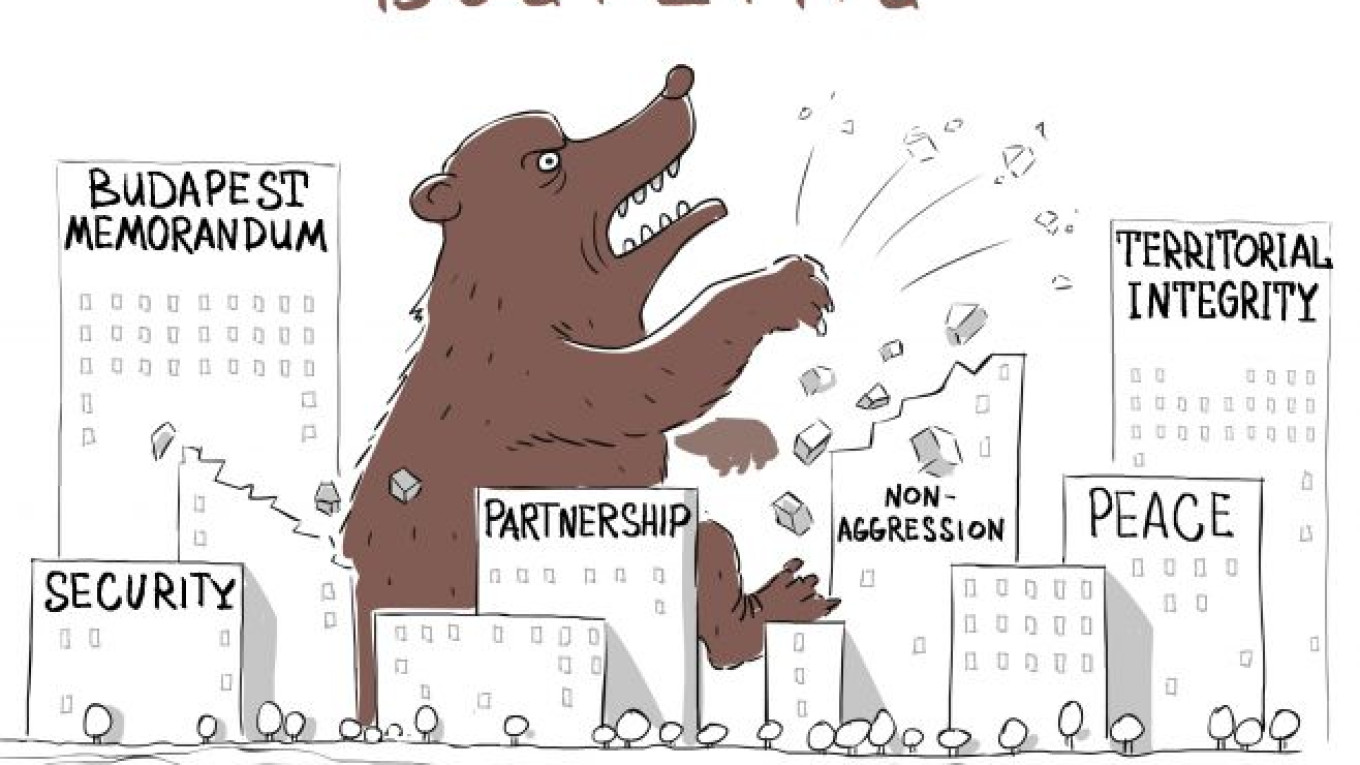It is beyond our understanding how Russia can legitimize occupying another state's territory without any legal grounds, organize an unconstitutional "referendum" in an occupied territory that no country recognizes and send its citizens to organize provocations in the eastern regions of Ukraine on a regular basis. What's more, Russia is now trying to become a third party in the settlement of the conflict it initiated.
Ukraine is not the aggressor that initiated a war against another state. It does not require "oversight" or dominance. Virtually the entire world is united in its condemnation of Russia's aggression and that its hostile actions are a destabilizing factor in Ukraine.
Russia fabricates accusations of neo-Nazism in our Svoboda party. But if there is any "neo-Nazism" to speak of, it is the annexation of Crimea.
Before constructive political dialogue can occur with Russia, the Kremlin must stop its aggressive intervention in the domestic affairs of Ukraine under the fabricated pretext of "protecting Russian citizens against Ukrainian extremism." Russia must stop supporting separatist activities in the eastern and southern regions of Ukraine.
It is difficult to comprehend what Russia hopes to gain by seeking recognition of the so-called referendum in Crimea. Ukraine's Constitutional Court has confirmed that this so-called "will of the people" was unconstitutional. The same opinion was expressed by the Venice Commission, 14 members of the United Nations Security Council and the European Union. The referendum was not monitored by any authorized representatives of individual countries or international organizations. Most Crimean Tatars boycotted the vote — and for good reason. Under such circumstances, Russia's demands for recognition have no foundation whatsoever.
Against this background, it is worthwhile to recall examples of Russia's previous attempts to find "peaceful settlements" of frozen conflicts in regions such as the self-proclaimed Transdnestr republic, Nagorno-Karabakh, Abkhazia and South Ossetia.
Clearly, Russia is driven by realpolitik to preserve and expand these frozen conflicts, which are the Kremlin's trump card. Yet all civilized countries should understand that such geopolitical games pose a serious threat not only to the immediate conflict in the region, but also to the global balance of power.
We were surprised to hear Russia's concerns about the spread of neo-Nazi ideology. Ukrainian extremist laws prohibit political movements and actions aimed at inciting ethnic hatred. Perhaps Russia should look at the neo-Nazi accusations from a different angle: the March 17 referendum in Crimea resembles the Nazi Anschluss of Austria in 1938. The intervention of troops in the territory of a sovereign state, under the pretext of protecting citizens' rights, is an amazing historical coincidence resembling the Nazi annexation of Czechoslovakia's Sudetenland in 1938.
Regarding the idea of federalization, this structure suits Russia, where in some regions ethnic minorities make up a majority of the population such as Tatarstan, Kalmykia, Ingushetia, Buryatia and others. The idea of Ukrainian federalization is nothing more than another underhanded attempt to weaken Ukrainian statehood and subordinate Ukraine to Putin's geopolitical ambitions. Moreover, we see the attempt to impose any system of government on the sovereign country of Ukraine as a continuation of intervention in our internal affairs and we advise Russia to once again review Article 2 of the UN Charter establishing the sovereign equality of all members.
Ukraine guarantees the rights of all ethnic minorities. Meanwhile, Russia tries to use "humanitarian concerns" as a pretext to justify its own expansion: cultural, religious and ultimately military. Russia claims it is "intervening to protect its citizens" in Ukraine, but there is little, if any, proof of human rights violations against Russians.
It is the government's sovereign right to keep Ukrainian the only official language in the country. After all, Ukrainians make up nearly 80? percent of the country's population. We will not bend to pressure from President Vladimir Putin and his continued policy of Russification, which first began under the tsars and continued throughout the Soviet era.
Russia proposes that we ban state interference in religious affairs and interfaith relations in the new Ukrainian Constitution. We would like to propose to Russia's leaders to reduce the interference of the Moscow Patriarchate Church in internal Ukrainian affairs. Notably, every visit by Patriarch Kirill is accompanied by poorly disguised calls for political union with Russia.
Russia wants to become a "security guarantor" of the new Ukrainian government. After Russia's brazen military intervention in Ukraine, any talk of "security guarantees" is a farce. Russia has flagrantly violated its obligations of the 1994 Budapest Memorandum and other bilateral agreements that guaranteed Ukraine's territorial integrity. Therefore, it is obvious that we need to find a more reliable security model for Ukraine.
Russia's proposals constitute a direct threat to the existence of Ukrainian statehood. Under no circumstances will Ukraine accept Russia's unreasonable demands.
Oleh Tyahnybok is the leader of Ukraine's Svoboda party, one of three main parties that compose Ukraine's governing coalition, and a member of the Verkhovna Rada.


